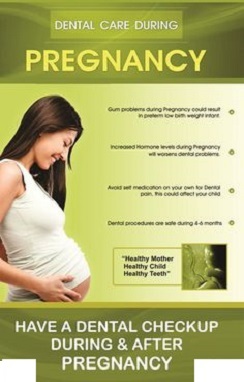Did you know that pregnancy can cause changes in the mouth gums and teeth, even in the healthiest women? That’s why it is important to go to the dentist regularly for check-ups and cleanings.
Dental x-rays and anesthesia are rarely dangerous to unborn baby, even during the first trimester. Dental X-rays are among the safest, and there is no reason to avoid them if your treatment cannot wait until after the baby is born.
The risk of an undetected dental problem could have a larger impact on an unborn baby than the x-ray itself. Dental X-rays are now digital so they give off less radiation than the traditional x-ray method. Lead aprons are provided when taking x-rays to protect your abdomen.
Morning sickness can affect your oral health. If you experience morning sickness frequently, the acid from your stomach can wear off your enamel. Be sure to rinse your mouth out with water or with a fluoride mouthwash to keep the acid level under control.
Periodontal disease (gum disease) is a bacterial infection, which can produce toxins in the body. Growing evidence suggests a link between gum disease and premature, underweight births. More research is needed to confirm how gum disease affects pregnancy outcomes. But it appears that gum disease triggers increased levels of biological fluids that induce labor. Gum disease doesn’t always show symptoms, some women may not know they have it. The only way to know for sure is by going to your local dentist for your routine checkup during pregnancy.
Pregnancy gingivitis occurs more frequently during pregnancy because the increased level of hormones. When you get pregnant, your body begins producing maternal hormones, which can affect your gums and make them red, swollen and inflamed. It can also make your gums more likely to bleed. Keeping your teeth clean especially focusing a little more around the gum line will help reduce or even prevent pregnancy gingivitis. Also instead of eating sweets substitute them with fruits, vegetables, and cheese.


